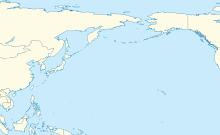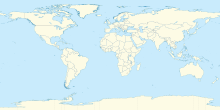Pingtung Airport
Pingtung Airport North 屏東航空站 屏東機場 Píngdōng Hángkōngzhàn Píngdōng Jīchǎng | |||||||||||
|---|---|---|---|---|---|---|---|---|---|---|---|
 | |||||||||||
| Summary | |||||||||||
| Airport type | Public | ||||||||||
| Serves | Pingtung, Taiwan | ||||||||||
| Elevation AMSL | 24 m / 78 ft | ||||||||||
| Coordinates | 22°41′43″N 120°28′40″E / 22.69528°N 120.47778°E | ||||||||||
| Map | |||||||||||
 | |||||||||||
| Runways | |||||||||||
| |||||||||||
| Pingtung Airport South / Pingtung AFB | |
|---|---|
空軍屏東基地 Kōngjūn Píngdōng Jīdì | |
| Coordinates | 22°40′20″N 120°27′42″E / 22.67222°N 120.46167°E |
| Type | Public |
| Site information | |
| Operator | Ministry of National Defense |
| Controlled by | |
| Site history | |
| In use | November 1920–present |
| Airfield information | |
| Identifiers | ICAO: RCDC |
Pingtung Airport (Chinese: 屏東機場; pinyin: Píngdōng Jīchǎng) are two airports in Pingtung City, Pingtung County, Taiwan (IATA: PIF, ICAO: RCSQ). The airport is currently home to the Republic of China Air Force 6th Tactical Mixed Wing,[1] and formerly offered commercial flights.
History
[edit]Pingtung Airport was opened in November 1920 during Japan's rule over Taiwan.[2] Originally, the base was used for "air policing", that is, the use of airplanes to govern indigenous peoples living in hard-to-reach areas. This practice ended in 1927 when the Imperial Japanese Army Air Service 8th Air Squadron was moved from Tachiarai, Fukuoka, to Pingtung.[2][3][4] With further expansions and more military personnel moving in, Pingtung Airport served an important role in the Japanese military throughout the Japanese colonial era and the Pacific War.[5] After Japan's defeat in the Pacific War in 1945, the base came into the control of the Republic of China Air Force.
Commercial flights
[edit]Between 1936 and 1942, Japan Air Transport and later Imperial Japanese Airways operated commercial flights to Taihoku Airfield (now Songshan Airport in Taipei).[6]
In November 1993, Pingtung Airport opened for commercial flights again. Since the passenger terminal was not completed, the Pingtung Performing Arts Hall was used as the airport terminal and passengers were shuttled to and from the south airport. In February 1995, a small passenger building was completed at the south airport; in 2005, a larger passenger building was completed at the north airport.[7]
Originally, TransAsia Airways operated flights out of the airport until Uni Air took over in 2007. However, with the completion of Taiwan High Speed Rail in 2007, very few people took the flights anymore, and commercial flights ceased in August 2011.[7]
See also
[edit]Notes
[edit]- ^ "六聯隊沿革". Republic of China Air Force (in Chinese (Taiwan)). 15 March 2019. Retrieved 2 February 2021.
- ^ a b "(屏東) 飛行第八部隊". Open Museum (in Chinese (Taiwan)). Academia Sinica. Retrieved 2 February 2021.
- ^ Hong 2011, p. 45.
- ^ Tseng 2012, p. 74.
- ^ Tseng 2012, p. 79, 84-85.
- ^ Chen 2011, p. 144.
- ^ a b 汪淑芬 (26 July 2011). "屏東航站將關閉 8月中停飛" (in Chinese (Taiwan)). Yahoo!. CNA. Retrieved 2 February 2021.
References
[edit]- Chen, Wen-shu (1 December 2011). "屏東空軍基地和民用機場的沿革變遷". 屏東文獻 (in Chinese (Taiwan)). 15: 140–153. doi:10.29682/JPTH.201112.0006.
- Hong, Zhi-wen (December 2011). "二戰時期日本海陸軍在臺灣之飛行場" (PDF). 臺灣學研究 (in Chinese (Taiwan)). 12: 43–64. Retrieved 2 February 2021.
- Tseng, Ling-yi (Summer 2012). "二次大戰前日軍在台航空兵力發展之初探 (1927-45)" (PDF). Taiwan International Studies Quarterly (in Chinese (Taiwan)). 8 (2): 69–90. Retrieved 2 February 2021.






